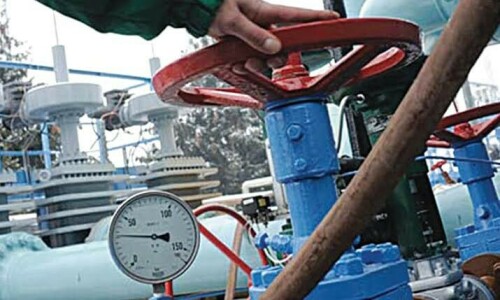ISLAMABAD: The federal and Azad Jammu and Kashmir governments on Wednesday signed an implementation agreement with a Chinese consortium for development and operation of $1.98 billion Karot Hydropower Project on river Jhelum at a levelised tariff of 7.57 cents per unit for 30 years.
The agreement was signed by Secretary Electricity of AJK government Fayyaz Abbasi, Managing Director of Private Power and Infrastructure Board (PPIB) Shah Jahan Mirza and Chief Executive Officer of Karot Power Company Sheng Zhendong.
The 720-megawatt Karot Hydropower Project is a priority project of China-Pakistan Economic Corridor (CPEC) to be completed in 2020. It has the capability to generate 3.249 billion units of clean electricity per year for the national grid.
The project is being developed on a Build-Own-Operate and Transfer (BOOT) basis at an estimated cost of $1.98bn including a development cost of $1.698bn and interest during construction of $243m by Karot Power Company Private Ltd, comprising of M/s Three Gorges South Asia Investment Ltd (TGSAIL) and Associated Technologies (Pvt) Ltd of Pakistan.
The project would be constructed on a concrete gravity of 91 metres high dam with a crest length of 320 meters near the village of Gohra. The dam’s reservoir will be approximately 152 million cubic metres in volume, with a length of 27 kilometres. Around 72 homes and 58 businesses are expected to be relocated due to project construction while 2.8-km of the Karot-Kotli road, and 8.9-km of the Azad Pattan-Kahuta road will need relocation.
The National Electric Power Regulatory Authority (Nepra) had approved in February this year the project’s levelised tariff at 7.57 cents per unit for 30 years at an exchange rate of Rs101.6 per dollar. Its ground breaking ceremony was held in January.
In July this year, the federal government had decided to transfer the ownership of private sector hydropower projects to the governments of Azad Jammu and Kashmir and Gilgit-Baltistan on the basis of their location on completion of a 30-year term of the private sector contracts to facilitate a 720MW project under CPEC.
The decision was taken by the Economic Coordination Committee (ECC) of the cabinet to bring uniformity among projects built under the power policies of 2002 and 2012. Under all power policies, private sector hydropower projects built on the build-own-operate-and-transfer (BOOT) model stand transferred from the project sponsor to the Government of Pakistan or its nominated entities. Under the 2002 policy, the ownership was to be transferred to the federal government or the Water and Power Development Authority (Wapda) while the 2012 policy required these to be transferred to the respective regional governments.
Also, the water use charge under the 2002 policy was only payable at the rate of 15 paisas per unit to the province, AJK or GB governments while this was increased to 42 paisas per unit under the 2012 policy to encourage provincial and regional governments to facilitate development of private hydropower projects.
To ensure that this was not seen as a special favour, it was decided that these concessions would require to be extended to any other upcoming hydropower project being implemented under the
2002 policy for which the financial close had not yet been achieved, irrespective of the location of the project.
Published in Dawn September 29th, 2016












































